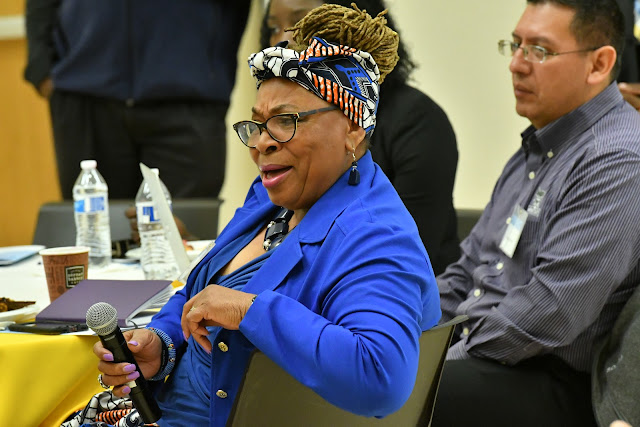As different demographic information flashes on a screen in
front of a roomful of educators from around Utah, demographer Pam Perlich
pauses at one troubling data point in particular – locations of the largest
concentration of men of color throughout the state. Jails and prisons. “We have
work to do,” she tells the audience.
Perlich, director of Demographic Research for the University
of Utah, sets the tone in the opening hour of the recent Men of Color Summit
2018 at Salt Lake Community College’s South City Campus. The event’s theme is
“The Urgency Is Now!” The exigency centers on the inequity in higher education
of the retention and graduation rates for men of color and the factors that
contribute to those relatively low rates.
Each slide shown during the summit’s opening presentation paints
a picture about men of color in Utah. Fewer bachelor degrees. Lower median
household income. Higher unemployment rate. More males living in poverty. A
lower proficiency in reading and math. More broadly, Perlich’s data shows
higher rates of suspension from high school among men of color, and that black
and Latino males are less likely to graduate than white males.
Dr. Pam Perlich
Throughout the rest of the day, Dr. Frank Harris and Dr. J.
Luke Wood, both professors at San Diego State University, dig deeper with
panelists and guests into challenges facing men of color, including implicit
bias, microaggressions, assumption of criminality on college campuses, and the
three Ds – distrust, disdain and disregard. When dealing with these issues, Harris
and Wood suggested summit attendees use the so-called RAVEN approach, which
includes to first (R)redirect the person exhibiting bias or a microaggression
and (A)ask the person questions such as “I think I heard you say…What did you
mean by that?” After that, one could offer a (V)values clarification such as,
“You know, in this department we work hard to create a space that is safe and
welcoming for all students.” From there, (E)emphasize your thoughts or
feelings, telling the offending person how what they just said makes you feel
and then move on to (N)next steps, which could vary from continuing discussion
with the individual or somehow moving past the incident.
To achieve “equity mindedness” in higher education, summit
attendees talked about the need to recognize ways systemic inequities impact
“disadvantaged minoritized” people in areas like education, employment,
healthcare and the justice system. Conversations at the event focused on how disparities
in those areas need to be reframed in
order to reveal institutional underperformance rather than blaming negative outcomes
solely on those affected. For example, staff and faculty at higher education
institutions need to reflect more on the impact their roles play in the
academic paths of men of color. In regard to this, summit goers were asked to
consider the question, “What are we doing, or not doing, as a district, college
or unit that results in our boys and men of color not doing as well as they
should?”
Dr. J. Luke Wood
Dr. Frank Harris







